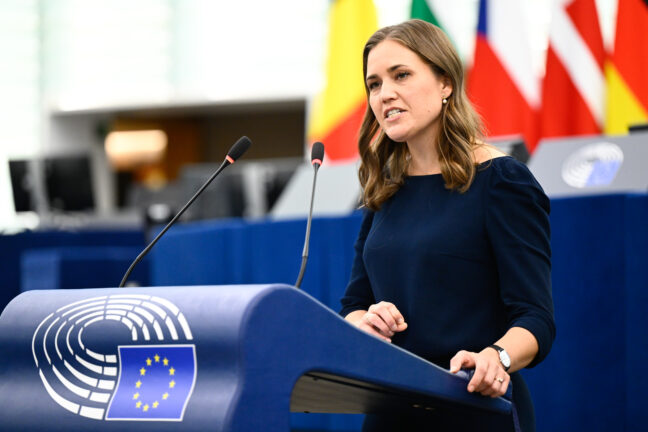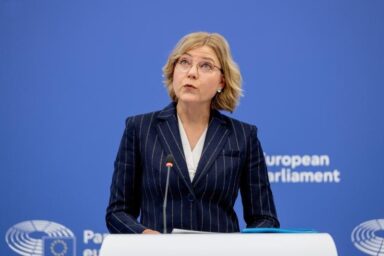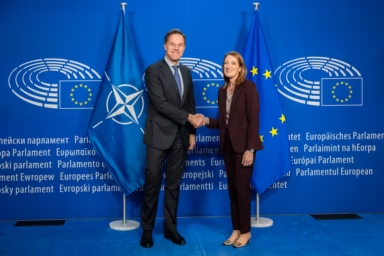Europe’s digital rulebook has become a test for its political sovereignty. This week in Strasbourg, lawmakers debated digital sovereignty in the EU, calling for full implementation of its regulation and reduced reliance on non-EU providers. This discussion took place amid renewed pressure from the United States, with tariff threats from President Donald Trump and Big Tech lobbying to relax enforcement.
As the debate unfolded, Commission Executive Vice-President Henna Virkkunen drew the line clearly. “It’s not up to companies to decide whether to comply with our rules, and it’s not up to them or to other countries to decide how we enforce our rules. Europe decides for itself”, she said.
“We will not hesitate to take further action”
The debate “Promoting and protecting digital sovereignty in the EU” was held in the European Parliament on Wednesday, 8 October. Marie Bjerre,Danish Minister of European Affairs, opened the discussion. She framed the Union’s digital laws as a matter of principle over protectionism.
It’s not up to companies to decide whether to comply with our rules, and it’s not up to them or to other countries to decide how we enforce our rules. Europe decides for itself. — Henna Virkkunen, Commission Executive Vice-President for Tech Sovereignty, Security and Democracy
“Our goals remain clear. First, to protect our citizens online, as we do offline. Second, to defend our autonomy in setting our own rules”, she told MEPs. Ms Bjerre added that the regulation “applies equally to European, Chinese or US origin companies. To put it in short, the rules do not discriminate”. Her remarks came after President Trump called Europe’s tech laws “unfair to American business” and warned of potential trade retaliation.
Moreover, Ms Bjerre stressed that the Single Market remains highly profitable. According to her, compliance costs are “low compared to the benefits” of operating in Europe. “The cost of compliance with the Digital Services Act (DSA) and the Digital Markets Act (DMA) is very low compared to the financial benefits of operating in the single market”, she said.
In April this year, we took the first two decisions under the Digital Markets Act for Meta and Apple. We will not hesitate to take further action to ensure compliance. — Henna Virkkunen, Commission Executive Vice-President for Tech Sovereignty, Security and Democracy
From the Commission, Henna Virkkunen detailed enforcement progress. Twenty-five platforms have been designated under the DSA, 14 proceedings opened, and additional staff recruited for supervision. “In April this year, we took the first two decisions under the DMA for Meta and Apple. We will not hesitate to take further action to ensure compliance”, she warned.
Resistance against Trump and Big Tech pressure
Lawmakers across political groups backed the digital regulation and linked enforcement to the achievement of European sovereignty. MEP Axel Voss (EPP, DEU) said Brussels must respond to Big Tech’s resistance. “I think we need to start thinking seriously about this, and maybe the possibility of having stricter consequences if this approach continues. Maybe through checking or even putting an end to the transatlantic exchange of data,” MEP Voss said.
In the same optic, socialist MEP Alex Agius Saliba (S&D, MLT) framed enforcement as the real test of sovereignty. He urged the Commission to use its powers decisively. “Only when Meta, Apple, X and others start respecting our rules can we reach our aims”. To him, the struggles go beyond laws. “This is not only a question of imposing fines. It is a situation where the European Commission should show that it is against how these platforms are operating, and the aim is to protect our laws, our democracy,” added Mr Saliba.
You might be interested
This is not only a question of imposing fines. It is a situation where the European Commission should show that it is against how these platforms are operating, and the aim is to protect our laws, our democracy. — MEP Alex Agius Saliba (S&D, MLT)
The Greens reinforced the call for enforcement. The group argued that Europe’s digital sovereignty is being tested by renewed lobbying from Washington and Silicon Valley. MEP Kim van Sparrentak (Greens, NLD) warned that the Commission must not absorb a deregulatory agenda from across the Atlantic.
“In Europe, we ensure that AI is safe and technology actually contributes to people, society and the environment while fostering innovation. So the question is, will the commission be fooled by tech CEOs and their top lobbyist, Donald Trump, or will the Commission stand up for European tech companies and the citizens of Europe?”, asked Ms Sparrentak.
Sustaining these deregulation concerns is the fact that the European Commission launched in September its consultation on digital simplification, which runs until mid-October. This will feed into the upcoming Digital Omnibus proposal, expected by the end of the year.
Surveillance concerns over Chat Control
If the sovereignty debate showed overall institutional unity, the Union’s limits surfaced with MEPs using the debate to point out criticisms of the Child Sexual Abuse Regulation, known as Chat Control. The proposal, which would require online services to detect and report abusive material, was criticised, especially by the right-wing groups.
Opponents argue that the law is incompatible with privacy rights. MEP Anders Vistisen (Patriots, DNK) warned that with the proposal, “essential freedom rights are now under attack from an EU that apparently has an ambition to build its own digital surveillance state”. MEP Christine Anderson (ESN, DEU) struck a similar tone. She called chat control “mass scanning of private messages” to protect the commission from scrutiny and people’s criticism.
Politically, the file remains stalled. Germany’s opposition to mandatory detection has deprived the Council of a qualified majority. Yet the scheduled 14 October vote will dictate the proposal’s future.











